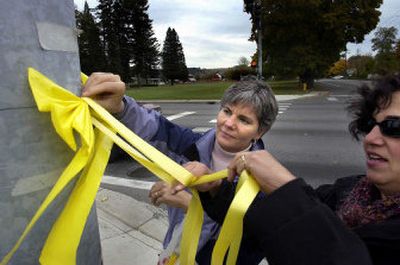Love is Christmas over the Fourth

The e-mail invitation asked friends, family and fans of Andrew “Spiff” DeLateur to join his mother, Mary, in decorating a Christmas tree – in July.
Andrew, a lance corporal in the Marines, will miss Christmas at his Spokane home, because he’ll return in August to Iraq, for the third time.
Some of us who received the e-mail invitation wanted to react, not in a brave way, but in the way we truly felt. Scream a little. Cry a lot. Or withdraw. Not again. Not a third time.
We’d held vigil with Mary during Andrew’s first tour, and then again during the second tour, when we eagerly read her e-mail updates about Andrew’s life in Iraq. And when he returned home, safe and sound, ahh, the relief.
In October, businesses along Argonne Road ran reader boards welcoming Andrew home. Neighbors and strangers tied yellow ribbons everywhere for him. We all thought, this is it. He’s back. He’s safe. We can breathe again.
Well, there’s no safe from this war in Iraq.
And so we showed up at Mary’s house, hearts heavy, Christmas candles in hand. Holiday music played in the background as we hung silver snowflakes from the kitchen ceiling, wearing our shorts or summer dresses. We didn’t let our eyes linger too long on the portrait of Andrew and his two brothers as small boys, playing in the trees.
We took our cue from Mary. She possessed a calm. In a soft voice, she instructed us: “Hang the red chili lights over here. And over there on the table, wrap those presents, please.”
Later, she would tell us about her internal debate whether to do Christmas in July for Andrew. In 1983, she prepared Thanksgiving dinner two weeks before the actual holiday, because her husband Tony’s brother, Bob, a Navy pilot, was on his way to Guam. A year later, the jet Bob was riding in disappeared into the ocean, a peacetime Navy accident, and no trace of the crew has ever been found.
Mary felt superstitious. She thought: If I celebrate Christmas early, Andrew won’t come back because that’s what happened when I celebrated Thanksgiving early and Bob didn’t come back.
She researched superstitions and found that they are used to quell fears of the unknown. She read somewhere that superstitions reflect “abject attitudes toward God.”
For advice, she called a relative who lost a daughter to cystic fibrosis. You go for it, the mother said.
And so Mary filled their home with memories of Christmas past that touched all five senses. She shopped for the traditional meal – turkey, mashed potatoes, green beans. She crumbled cedar boughs to release the smell of December.
And when Andrew arrived from Camp Pendleton over the long Fourth of July weekend, he walked into his childhood home decorated for Christmas, and he said to his mother, “Rushing the season a bit, aren’t you?” He hugged her then and didn’t say another word.
Over the long weekend, instead of gloom hanging over the family, there was much joy. Andrew hummed “Jingle Bell Rock,” and Mary watched her three grown sons, toddlers such a short time ago, play in the backyard pool with remote-control boats, their Christmas presents.
She and Tony will fly to Camp Pendleton in August to say goodbye to their 21-year-old son. The vigil will then begin again.
Those of us honored to be friends, family and fans of Andrew will hold vigil once more for 10 months, through the weariness some of us feel about this war, through the fear we sometimes experience when we receive Mary’s e-mails and see Andrew’s name in the subject line.
We will again take our cue from Mary, who tells us that love is the opposite of fear, and we believe her, because to not believe her is an abject attitude toward life, toward the power of a mother to hold Christmas in July and then send a son off to war — for the third time.